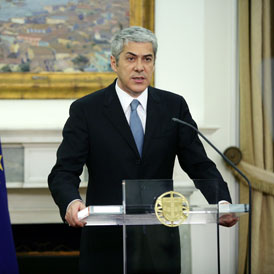Portugal calls for EU financial bail-out
Portugal’s Jose Socrates asks the EU for financial assistance, paving the way for the third bail-out after Greece and Ireland, and exposing the UK to a payment of up to £4bn.

Prime Minister Jose Socrates said in a televised statement that parliament’s rejection of additional austerity measures last month had aggravated the financial situation, ultimately making the request for aid “inevitable”.
The minority Socialist government resigned on March 23 after the parliamentary defeat, causing political and financial uncertainty.
Bond yields spiked, ratings agencies downgraded sovereign and bank debt, and local banks warned this week they may no longer be able to buy government paper.
Although Portugal’s public debt is lower than Greece’s or Ireland’s at 9.2 percent of GDP in 2010, the country’s chronic slow growth has raised long-term doubts about its solvency.
“I tried everything, but in conscience we have reached a moment when not taking this decision would imply risks that the country should not take,” Socrates said
EU officials have said negotiations could move quickly but emergency loans are normally only disbursed once there is a signed agreement with a fully empowered government, ratified where appropriate by parliament.
If it goes ahead Lisbon is likely to need between 60 and 80 billion euros in European and International Monetary Fund loans over three years, but any assistance will be subject to strict conditionality.
This is a responsible move by the Portuguese government for the sake of economic stability. Olli Rehn
An EU source said the interest rate on loans for Portugal would depend on the timing of the deal and whether the euro zone’s rescue fund has to borrow on the markets.
The European Commission’s top economic official, Olli Rehn, welcomed the Portuguese decision, saying it was in the interest of the 17-nation single currency area as a whole.
“This is a responsible move by the Portuguese government for the sake of economic stability in the country and in Europe,” Rehn said.
The IMF said it had not received a request from Portugal for financial assistance but it stood ready to help. EU paymaster Germany insists on IMF involvement as a condition for bailouts.
The new economic crisis confronting Europe comes weeks after an EU summit to confirm a new permanent 700 billion euro bail-out facility for eurozone countries in trouble.
Read more special report: from crash to cuts
The UK will not be liable for any contributions to the new fund, but does contribute to the current temporary 440 billion euro bail-out fund which was set up to help Greece and which runs until mid-2013. The UK was signed up to that scheme by the Chancellor at the time, Alastair Darling. Joining the scheme was opposed at the time by the current Chancellor George Osborne, then in opposition.
Now Mr Osborne may have to preside over the extension to Portugal of the UK commitment, albeit in the form of financial guarantees rather than actual cash.
Think Tank Open Europe recently estimated the UK’s share of such a bail-out as anything between 810 million and 3.7 billion euros.
Euro zone and EU finance ministers are due to meet in Budapest from Friday to discuss Portugal’s financing needs.